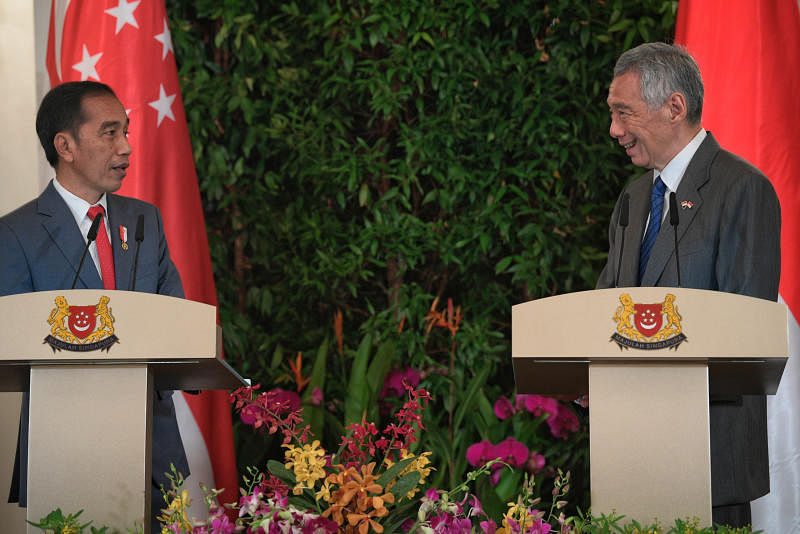Leaders' Retreat: Singapore and Indonesia agree on framework to discuss airspace management, military training
Sign up now: Get ST's newsletters delivered to your inbox

Prime Minister Lee Hsien Loong and Indonesian President Joko Widodo during a joint press conference at the Singapore-Indonesia Leaders’ Retreat at the Istana on Oct 8, 2019.
ST PHOTO: MARK CHEONG
SINGAPORE - Singapore and Indonesia have agreed on a framework to discuss two longstanding bilateral issues - airspace management and military training - with leaders of the two countries saying they are happy with the progress.
Both leaders have also instructed their ministers and officials to follow up with detailed negotiations on the basis of this framework, and to conclude and implement agreements in a timely manner, said Prime Minister Lee Hsien Loong on Tuesday (Oct 8).
"This framework acknowledges that the core interests and rights of both countries must be recognised and respected. And that Indonesia and Singapore should negotiate agreements on these two issues that are durable and for the long haul," said Mr Lee, following a meeting with Indonesian President Joko Widodo as part of a Leaders' Retreat.
Mr Lee made these remarks in a joint press conference with Mr Joko, better known as Jokowi, during which both leaders spoke on the growing bilateral relations and discussed areas of cooperation, including people-to-people ties, connectivity and defence collaboration.
Both leaders also gave updates on the issues of the Flight Information Region (FIR) over the Riau Islands, which is currently managed by Singapore, and military training in accordance with the United Nations Convention on the Law of the Sea (Unclos).
Indonesia is seeking a return of airspace that has been managed by Singapore air traffic controllers for several decades under international arrangements to ensure the safety of aviation.
At Tuesday's (Oct 8) press conference, Mr Lee said he told Mr Joko that because they have built up a good relationship, he would like the countries to start working on the two issues in an "open and constructive manner".
Mr Lee said that ministers and officials of the two countries have held preliminary discussions on the issues over the last few months, and have agreed on a framework, laying out the core principles and considerations concerning the matters.
He added that the framework offers a "sound and comprehensive basis" to work out solutions to the two issues, separately but concurrently.
Mr Joko said that Indonesia also welcomes the framework for negotiation of the FIR.
"Indonesia respects the position of Singapore, which understands Indonesia's wish to oversee its own airspace. Our technical team has started negotiation, we encourage the negotiation to be speedily achieved with concrete result," Mr Joko added.
A report in The Jakarta Post noted that the framework says that, among others, Indonesia and Singapore are committed to reaching an agreement on FIRs and on military training in the South China Sea. It also states that both countries recognise that "FIRs are not about sovereignty but the safety and efficiency of air traffic" and acknowledge that "military training in the South China Sea is governed by Article 51 of the 1982 UN Convention on the Law of the Sea".
It also shows the negotiating positions of the two sides.
Indonesia wants Singapore to respect "Indonesia's sovereignty over its territory, including its territorial waters, archipelagic waters and its airspace" and "to understand Indonesia's strong desire to align the FIR in a timely manner which corresponds to its territorial sovereignty".
Singapore, meanwhile, requires Indonesia "to fully respect and recognise Singapore's rights to conduct military training in the South China Sea in accordance with Article 51" and to understand that Singapore's interests include the present and future requirements of Changi Airport.
On the defence front, Mr Lee said that defence relations are robust and have continued to grow from strength to strength.
He cited the full calendar of exercises and exchanges between their defence establishments, including Exercise Safkar Indopura which was held last month between both armies, and the 20th anniversary of Exercise Camar Indopura, a joint air maritime surveillance exercise, held between the air forces.
Mr Lee said he was glad to see that both sides are deepening their relationship, through joint counter-terrorism exercises and through support of the Asean Our Eyes initiative, an Indonesian-led platform for counter-terrorism intelligence sharing.
To further cooperation, Indonesia's Ministry of Defence (Kemhan) and Singapore's Ministry of Defence (Mindef) agreed to institutionalise the Kemhan-Mindef Interaction Programme, an annual mechanism for bilateral dialogue and exchanges.
The initiative will allow both countries' defence ministries to regularly exchange insights and perspectives, and strengthen bilateral defence relations, said Mindef.
Following a series of joint counter-terrorism exercises from 2017 to last year, the Singapore Armed Forces and the Indonesian Armed Forces, known as Tentara Nasional Indonesia, will also conduct a counter-terrorism Field Training Exercise in 2020 in Indonesia, said Mindef.


